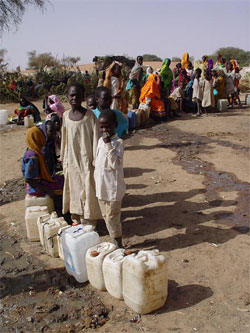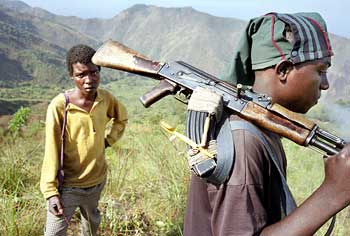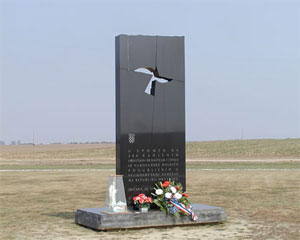Praying for Peace:
The Fifth Anniversary of the Iraq War
For Sunday March 30, 2008
Lectionary Readings (Revised Common Lectionary, Year A)
Acts 2:14a, 22–32
Psalm 16
1 Peter 1:3–9
John 20:19–31
Financial cost of the war counter. |
Last week marked the fifth anniversary of the United States's invasion and occupation of Iraq on March 19, 2003.
It will take decades to learn whether Iraq evolves into the first democratic government among the twenty-two Arab states, or disintegrates and destabilizes the Middle East even further. But this much is crystal clear — after five years of war the human toll has been catastrophic. The economic costs have been stratospheric. And the geo-political consequences, as many predicted, are tragic. As the Iraq war enters its sixth year, there's no exit strategy and no end in sight.
The war has cost over $500 billion, or about $275 million per day. The Department of Defense counts nearly 4,000 American soldiers dead and 60,000 injured. More American soldiers died in 2007 (901) than in any single year since the war began. Identifying how many Iraqis have died is complex and controversial, but some studies suggest that at least a million Iraqis have died — more than 600 people every day since the war began. Four million Iraqis have been made refugees. As in all wars today, innocent civilians have suffered the most.1
Human cost of the war counter. |
What might our world look like today if the United States, in a preemptive and unilateral decision, purely from motives of self-interest and international security, had invested $500 billion in the Muslim world for health care and hospitals, schools and electricity, micro-enterprise and cultural institutions? Or spent the money on our own citizens to help those with no health insurance, fund social security, develop new sources of renewable energy, invest in schools and education, or retrain workers displaced by a fiercely competitive global economy?
Today far too many people suffer the ravages of war. As Jeffrey Sachs observes in his book The End of Poverty (2005),
In 1910, a leading British pundit, Norman Angell, wrote The Great Illusion, which rightly argued that national economies had become so interdependent, so much part of a global division of labor, that war among the economic leaders had become unimaginably destructive. War, Angell warned, would so undermine the network of international trade that no military venture by a European power against another could conceivably lead to economic benefits for the aggressor. He surmised that war itself would cease once the costs and benefits of war were more clearly understood.
Angell was correct about the economic devastation of war, but as Sachs observes, he grossly underestimated human irrationality. Just a few years after Angell published his book, World War I, a Great Depression, then World War II, unleashed catastrophic consequences, economic and otherwise, for all the world.
 |
Darfur refugees in Sudan |
Right now there are about ten so-called "major wars" in the world, defined by the United Nations as wars that inflict at least 1,000 military deaths per year. In addition, there are about twenty "lesser" conflicts. But things are worse than the UN criterion might suggest, for it used to be that wars killed mainly combatants. In World War I, for example, only about 5% of the casualties were civilians. Today more than 75% of war casualties are non-combatants. For these millions of people the world is very unsafe.
In Sudan's western Darfur region, Africans are systematically killing Africans in an "intrastate" war. Two million people out of a population of four million have been displaced. Their homes have been razed, their wells poisoned, their subsistence agricultural economy ruined, their women systematically raped and branded, and their villages destroyed. This on top of twenty years of drought and famine that the government has wielded as a weapon of war. Estimates vary, but about 300–500,000 black African Muslims have been killed by the Sudan government (both army and police) and the janjaweed militia (literally "devil on a horse") that they have funded, trained (complete with graduation exercises), armed, and closely collaborated with in attacks.
The most under-reported war, certainly relative to its death toll, has been the conflict in the Democratic Republic of Congo (former Zaire) that has involved at least nine other African nations since 1998. According to a major mortality survey by the International Rescue Committee in January 2008, "conflict and humanitarian crisis in the Democratic Republic of Congo have taken the lives of an estimated 5.4 million people since 1998 and continue to leave as many as 45,000 dead every month." With a population of about 50 million Congolese from 200 different ethnic groups, that's 10% of the population. A comparative figure for our own country would be 30 million deaths. Millions more Congolese have been displaced or fled to countries that are barely more stable.
In the spring of 2003 I lectured at the Evangelical Theological Seminary in Osijek, Croatia. Twelve years earlier, in June 1991, Croatia declared its independence from Yugoslavia. The Serbian government responded by surrounding the city of Vukovar on all four sides so that people couldn't escape. Tanks thundered down residential neighborhoods; combat raged from house to house. Vukovar epitomized a hellish war that, as a student of mine put it, “had no rules.” It fell to the Serbs on November 18, 1991. Since Vukovar was only twenty minutes from campus, a student took me there. As I walked through its streets that spring, trees grew out of what used to be living rooms and kitchens. At the train station I scooped up a handful of shrapnel that now sits on my bookshelf.
Vukovar provided one of the best documented and thoroughly investigated cases of horrific war crimes. Today web pages feature photos of soldiers proudly displaying the decapitated heads of the enemy. Of special note was the case of the Vukovar hospital. On November 20, 1991, the Serbs raided the hospital and loaded up nearly 300 patients, medical staff and civilians. They drove these Croats outside of town a few kilometers to Ovcara, where they slaughtered them and dumped them into a mass grave. Today on that road to Ovcara signs still warn you of land mines.
 |
Teenage soldiers in the Congo |
As I stood silently in the sweltering sun by that mass grave in Ovcara, I felt overwhelmed. What did my two seminary students who were from Vukovar remember of all this? How had it scarred their psyches? What were the bus loads of children who came here for field trips told? Were they told, “see what these bastards did to us? Revenge will be ours some day.”? Or were they told, “love your neighbor and don’t ever let something like this happen again.”? What did the elderly people from the capital of Zagreb (four hours away) think and feel when they came here to make their peace with history?
The wars in Iraq, Darfur, Congo, and former Yugoslavia — and those in Chechnya, Palestine, Rwanda, Kashmir and around the world — didn't have to happen. They weren't inevitable, and they don't have to continue. They indict our failure of international will, political imagination, moral integrity, and basic good will toward fellow human beings.
Christians are biased people, or at least they should be. The words of Jesus in this week's gospel make this clear. Three times he blesses his disciples with the words, "Peace be with you" (John 20:19, 21, 26). He then sends them out with that same message of peace for all the world: "As the Father has sent me, I am sending you" (20:21). Followers of Jesus wish God's peace to every human being. We favor all that promotes human life, health, and wholeness, what the Jews call shalom. We have an unapologetic bias toward helping the poor, the weak, the marginal, and the vulnerable for whom peace is only a distant dream. Conversely, we lament and deplore all that promotes death, destruction and human degradation.
The Psalm this week reminded me that you know a good prayer when you hear it. Our shortest prayers are often our best prayers. They tend to be authentic and heartfelt, shorn of tired cliches and pious platitudes. The writer Anne Lamott says that she has prayer down to one word: "Help!" The psalmist utters a prayer notable for its brevity, tenderness and power. It's just four words, and you can pray it at any time, at any place, for any reason: "Lord, keep me safe" (Psalm 16:1).
 |
Mass grave at Ovcara, Croatia |
The psalmist's prayer implicitly acknowledges what we know from experience, that for far too many people our world is not a safe place. Peace, both human and divine, has eluded them. For many people the world is a horror of devastation and destruction, vulnerability and sorrow. In a favorite hymn of mine, the Protestant reformer Martin Luther (1483–1546) admitted that our world is filled with devils that "threaten to undo us." But the psalmist is confident about the God he worships. He's a God who "will not abandon us" (Psalm 16:7, 10). In an unsafe world He's a God of protection, preservation and refuge.
Christian prayer to stop war is both a pastoral duty and a political act. As God has promised never to abandon us, we ought never to abandon the cause of peace and the people who so badly deserve it. We pray for soldiers and civilians alike, for governments and diplomats, for peace makers and treaty negotiators, for Iraqis and Congolese, Palestinians and Chechnyans, as much as for Americans: "Lord, keep us safe. Please don't abandon us. Somehow, some way, save us from our warring impulses. Please, keep us safe and bring us peace."
For further reflection:
For further reading see Chris Hedges, War is a Force That Gives Us Meaning, Andrew Bacevich, The New American Militarism, Brian Steidle, The Devil Came on Horseback; Bearing Witness to the Genocide in Darfur, and on the Congo, Adam Hochschild, King Leopold's Ghost: A Story of Greed, Terror, and Heroism in Colonial Africa.
[1] The war could cost much more according to Joseph Stiglitz and Linda Bilmes in The Three Trillion Dollar War (2008). For a rebuttal of the claim that a million Iraqis have died in the war see Megan McArdle, "Body Count" in The Atlantic, April 2008, pp. 26–28.
Image credits: (1) National Priorities Project; (2) Just Foreign Policy; (3) Save Darfur; (4) Economist.com for July 6, 2002; and (5) Općina Gornji Kneginec.






